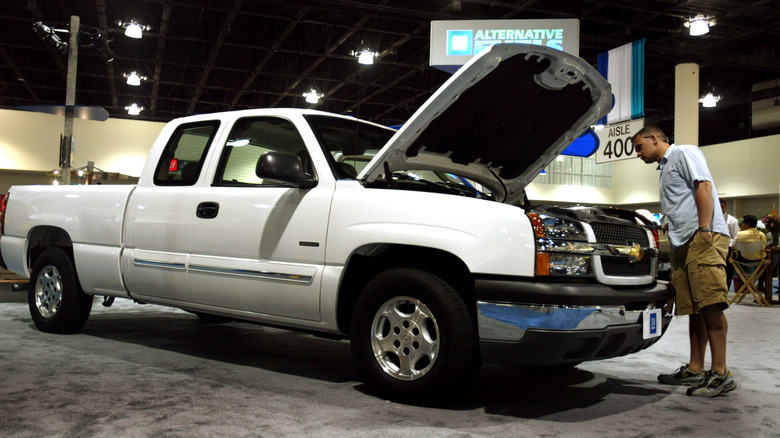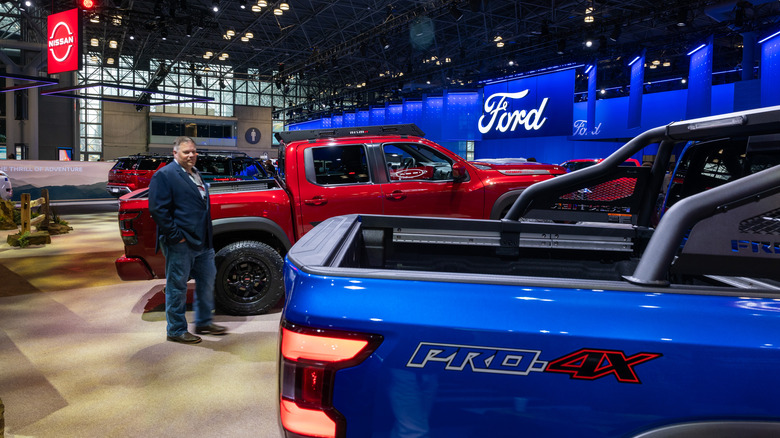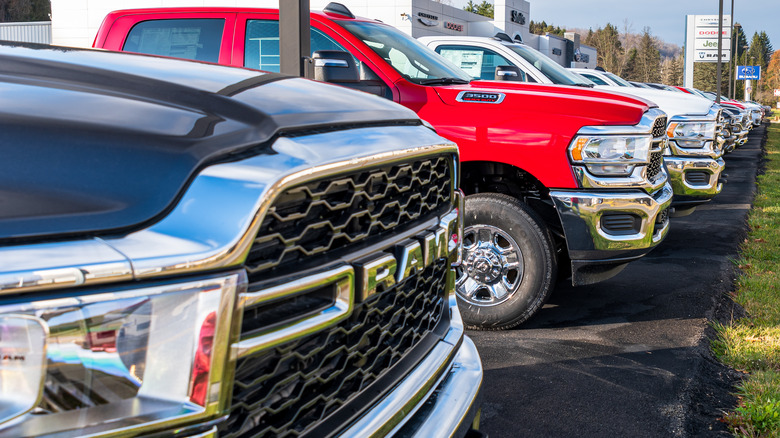10 Pros And Cons Of Hybrid Trucks: Are They Worth Buying?
A hybrid truck might be on your short list these days as car shopping tasks include more and more electrified vehicle research. Hybrids offer a unique blend of combustion engine power with the fuel efficiency of an electric, but they do come with some tradeoffs—as is to be expected with any new technology, of course. Even with a few drawbacks, the case for a hybrid car of any sort is compelling. In the truck world, this hasn't always been the case, but new variants and breakthrough improvements in torque, horsepower, and other key metrics are making hybrid trucks a true option for buyers.
There's still a lot to consider, though, when approaching the hybrid truck marketplace. With new electric propulsion options making inroads across the automotive space, there's a lot more to choose from now. This is great for those who haven't liked the spread thus far, but potentially confusing for interested buyers coming to this market segment for the first time. Here are some of the key positives and potential hangups in the field of hybrid trucks today.
Pro: Best of both worlds without the need to constantly charge up
Perhaps the best place to begin when considering a hybrid truck is versatility. Hybrid vehicles combine the best aspects of both primary propulsion methods used in the automotive world today. As a result, these vehicles sport quality fuel efficiency ratings, decent power output, and cost effective operation. On the flip side, by bringing in a sort of light version of both models under the hood, hybrid vehicles don't suffer from the same drawbacks that a singularly focused vehicle might bring to bear. Anyone considering a switch to an electric vehicle, for instance, might immediately worry about range, especially in the winter time. Electric cars have been known to exhibit shorter overall ranges between 'fill ups' (whether that be at the pump or plug) than cars with internal combustion engines—a problem further exacerbated in colder weather. While electric vehicles are seeing their range increase with successive model year releases, hybrid cars eliminate that worry for prospective buyers when choosing between hybrid and electric.
A hybrid vehicle utilizes both gasoline power drive modes and an electric motor for low speed operation and as a supplementary tool that extends range even further. Hybrid driving allows you to charge up battery independently of active use or even complete a recharge while the car is in operation. With a range of new hybrid trucks on tap, this dual functionality is giving truck owners a new level of combined functionality.
Con: They are generally more expensive upfront
On the flip side, hybrid vehicles are often more expensive up front than their standard model alternatives. Many car manufacturers make hybrid models in basically the same layout as an existing standard internal combustion engine variant. As a result, a hybrid truck or smaller hybrid sedan might feel as if it's simply a new trim type added to a vehicle make's existing lineup. Even with new releases for electrified options, the 'feel' often ties back into established design language to make the vehicle more familiar.
Simply as a result of standard market forces, the newer and more feature rich hybrid models will almost certainly be more expensive than standard trucks when you compare vehicles at the dealership. Electric vehicles of any type rely on a large battery pack that makes up a significant proportion of the vehicle's total material build cost. Estimates place the battery pack in a fully electrified vehicle at as much as 40% of a car's total value. Even with a smaller battery included in a hybrid model and a different overall build that doesn't include the full range of EV components, the electric propulsion system remains a complex and expensive inclusion in an electrified vehicle of any type. It's worth noting though that some hybrid trucks aren't drastically more expensive than their gasoline powered counterparts. A price tag of just a few thousand dollars difference might separate the two, bringing certain hybrid truck models into a more cost friendly range for shoppers looking to get a great car while also keeping to a strict budget.
Pro: Improved fuel efficiency may ultimately make up for the price difference
For buyers who aren't wildly concerned about the often heightened price tag of a hybrid vehicle, the benefits often come into play sooner than you might expect. For one thing, any level of electrification in a truck's propulsion system will take some of the burden off of your operational costs that factor in down the road. It's just a fact that hybrids and fully electric vehicles are more cost effective to operate than gasoline powered models.
Whether through charging at a public power installation, a home EV connection point, or utilizing a hybrid's recharging-while-driving functionality, fuel efficiency is better in these models, and therefore, will cost less over the long term. Drivers won't typically have to get into the weeds on calculating exactly how long they have to own the vehicle in order to start making out financially, either. The average car owner is driving the same vehicle for about 12.5 years, as of May 2023, and a hybrid can save a driver as much as $1,188 per year on fuel costs. The EPA estimates a more modest savings at around $250 annually for hybrid truck models, which still translates into $3,125 over the 12.5 year ownership average.
Of course, individual driving habits and fluctuating fuel costs will make each calculation unique, but the average driver may very well see a breakeven point on the difference purchase price between one model and another when opting for the more expensive hybrid.
Con: Combined 'gas mileage' isn't going to blow you away, however
The combined gas mileage rating of a hybrid truck isn't nearly as impressive as the figures for sedans and coupes, however. Anyone who is basing their understanding of hybrid vehicle performance on standard car models will be sorely disappointed when approaching the truck segment of the hybrid marketplace. Trucks are a different kind of beast when it comes to automotive spec. These vehicles are built to carry heavy loads and tow substantial weights. As a result, their entire makeup is focused on a different kind of driving than the typical five seater or even crossover SUV. Hybrid trucks simply don't get the same kind of range boost from the electric motor that other vehicles enjoy. Even so, there is a notable difference in the combined gas mileage that a hybrid truck delivers over its traditional internal combustion engine model. It's just worth noting that this boost won't be monumental, but rather a slight performance increase that helps offset your costs and the environmental toll that another truck might emit from standard running.
Pro: Power output is actually quite similar to traditional truck models
Even with an alternative propulsion method included in the framework of a hybrid truck, routine users might be surprised to find the power output is relatively similar to that of a standard truck model. One of the primary drawbacks of electrified truck builds in the past has been the lack of power when compared to a standard model. Electric vehicles do a great job when considering fuel economy and emissions standards, they also provide great torque and fast power delivery. But towing and muscular maneuvering have never stood out as a forte for electrified vehicles. That is until recently. Both in the heavy trucking industry and in consumer truck models, electrification has become a far smaller hindrance than in the past.
In the Ford F-150 range, for instance, the EV model (F-150 Lightning) can tow a payload of 7,700 pounds versus a 12,900-pound towage rating on the standard F-150 Lariat V8 build (verus 13,500 pounds for the traditional F-150 trim). The SuperCrew F-150 Lariat with hybrid power lingers far closer to the ICE trim than its EV counterpart. The hybrid model can tow 12,700 pounds. Haulage is a bit of a mixed bag, however. The EV can carry 2,000 pounds, and the hybrid F-150 build sits roughly in between the two at 2,455 pounds versus the ICE model's 2,900-pound rating.
Con: Repair works are bound to be more expensive
Costly repairs are sure to be a hard sticking point for any potential hybrid truck buyer. While it's true that electric vehicles tend to require servicing less often than ICE models, hybrids don't have this same roundly low-maintenance status. Moreover, even though fewer moving parts and a simpler motor design translate into sparser repair schedules and lighter bills for general maintenance for EV owners, maintenance tasks require specialized knowledge and tools.
This can make repair works potentially more expensive on the whole if a crucial system requires major servicing. Hybrid vehicles therefore suffer from both drawbacks when it comes to repair and maintenance necessities. Not only is a hybrid truck running with many of the systems that feature in electrified vehicles and therefore requires specialized service, but they also demand the same maintenance schedule as a standard vehicle. This includes regular oil changes and engine tune ups. Therefore, ownership will almost certainly result in a higher volume of maintenance when compared to an electrified vehicle and more expensive overall costs than either an EV or standard truck of the same basic variety. This relationship with the automotive shop is certainly a drawback of the hybrid marketplace more broadly.
Pro: Hybrids retain better resale value than ICE options at the present moment
Resale value is an issue for true EV models. EV owners suffer from the effects of deteriorating battery performance over the course of their use of the car. Replacing an EV battery can be immensely expensive, and after many years on the road, this is an issue that electric car owners will have to face off against. EV batteries lose maximum range on a yearly basis at a rate of about 2.3%, and even more when driven harshly or in challenging environmental conditions. As a result, the retail market for true electric vehicles is dismal at best.
This isn't the case for hybrid trucks, however. In fact, hybrid truck models often retain better resale value than their standard competitors in the present marketplace. Over the long term, the same basic concerns exist for hybrid motor battery packs, but with the use of a typical engine as the primary accelerator for the vehicle, this issue is far less pronounced and, in some cases, factors in as an afterthought at most. Models like the X enjoy better resale value than the alternative, standard options, giving drivers who buy them a unique outlook on their future driving habits and needs. It's always worth considering how a car purchase will affect your long term finances and mobility requirements. Purchasing something that has a shockingly bad resale value might give you a flashy ride today, but it can hinder your ability to fully transition into a new car in the future. A hybrid truck solves this concern.
Con: Interior space may work out smaller to accommodate the battery pack
The interior space of a consumer truck model is often somewhat cramped to begin with. Unlike SUVs and other cars, a truck is built to perform as a work tool first and a comfortable ride second (even if drivers don't always treat them this way). While many models these days have introduced enlarged cabins and luxurious seating arrangements, the primary build parameters remain grounded in the realm of heavy job site efficiency. You may lean on your truck primarily to tow a boat or to support DIY renovations around the house rather than enormous professional workloads, but underlying design priorities remain unchanged.
With additional propulsion elements included in the makeup of a hybrid truck, an already squeezed cabin is often likely to become even more cramped. There's only so much space under the hood and throughout the chassis to accommodate the transmission, engine, and other vital systems in a truck frame. With the introduction of a large hybrid battery pack and some of the other crucial systems that come into play, it should come as no surprise that many models have to tighten their belts somewhere and that often comes in the form of a smaller seating area. For those who primarily use their vehicle in a workplace setting, this might not matter substantially. However, truck owners who frequently use their vehicle as a family transportation option might feel this diminished cabin more intensely.
Pro: Tax credits can make the purchase an even more favorable endeavor
Tax credits for EVs make the purchase of an electrified vehicle even more valuable the drivers. Fully electric cars and trucks that meet certain eligibility requirements can provide a full $7,500 tax credit that can be used over successive tax years to reduce adjusted gross income and save on taxes owed. A number of hybrid vehicles also qualify for partial or full tax credits. However, It's worth investigating whether the build rules and battery component sourcing requirements include or exclude the hybrid truck you're considering before pulling the trigger on a purchase. The Ford F-150 Lightning qualifies for EV tax credits, but no hybrid trucks are currently highlighted for eligibility under the 2023 and 2024 updated tax incentive guidance. This doesn't mean that some models won't come into compliance and therefore ultimately make their way into the included list in the coming months and years.
If you are able to secure tax credits on your purchase, you can't currently levy this as a direct price reducing measure, although this appears to be something in discussions surrounding EV tax credit rules for the future. Even so, the ability to minimize your tax burden can result in a major windfall that sweetens the pot substantially.
Con: Getting your hands on one might be a tall order
One final con must be noted when considering the drawbacks of a hybrid truck in the current marketplace. Admittedly, many of the positive aspects of hybrid truck models will routinely outweigh the negative features at play. Great resale value, improved fuel efficiency (that results in a breakeven point and eventual racking up of a growing volume of savings at the pump), and solid power performance make hybrid trucks a hot commodity.
What this means for interested buyers is a competitive marketplace in which it may be difficult to find a hybrid truck to purchase when shopping around for a new vehicle. You may ultimately have to back order a new model or postpone your search for a few weeks or months as new products are rolled off the production line and delivered to dealerships around the country. As a functional drawback, low availability isn't necessarily a bug in the design or performance, but if you can't successfully procure a hybrid truck, then you can't enjoy all the benefits that come with it. This is an important feature to keep in mind, as a result.










